Related Research Articles

Harvard College is the undergraduate college of Harvard University, an Ivy League research university in Cambridge, Massachusetts. Founded in 1636, Harvard College is the original school of Harvard University, the oldest institution of higher learning in the United States and among the most prestigious in the world.

Dunster House is one of twelve undergraduate residential Houses at Harvard University. Built in 1930, it is one of the first two dormitories at Harvard University constructed under President Abbott Lawrence Lowell's House Plan and one of the seven Houses given to Harvard by Edward Harkness. In the early days, room rents varied based on the floor and the size of the room. Dunster was unique among Harvard dormitories for its sixth-story walk-up ; these rooms were originally rented by poorer students, such as Norman Mailer.
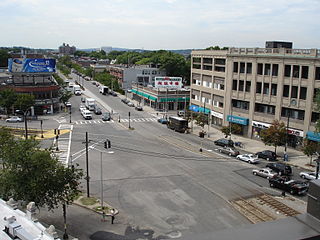
Allston is an officially recognized neighborhood within the City of Boston, Massachusetts, United States. It was named after the American painter and poet Washington Allston. It comprises the land covered by the zip code 02134. For the most part, Allston is administered collectively with the adjacent neighborhood of Brighton. The two are often referred to together as "Allston–Brighton". Boston Police Department District D-14 covers the Allston-Brighton area and a Boston Fire Department Allston station is located in Union Square which houses Engine 41 and Ladder 14. Engine 41 is nicknamed "The Bull" to commemorate the historic stockyards of Allston.

Pforzheimer House, nicknamed PfoHo (FOE-hoe) and formerly named North House, is one of twelve undergraduate residential Houses at Harvard University. It was named in 1995 for Carol K. and Carl Howard Pforzheimer Jr, major University and Radcliffe College benefactors, and their family.
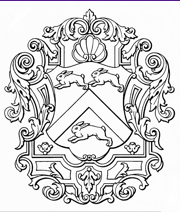
Leverett House is one of twelve undergraduate residential Houses at Harvard University. It is situated along the north bank of the Charles River in Cambridge and consists of McKinlock Hall, constructed in 1925; two 12-story towers completed in 1960; and two floors of 20 DeWolfe Street, a building Leverett shares with two other houses at Harvard. It has the largest student population within the Harvard house system.
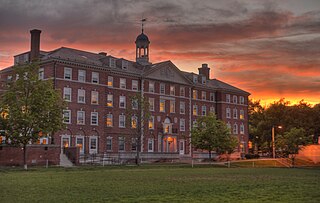
Cabot House is one of twelve undergraduate residential Houses at Harvard University. Cabot House derives from the merger in 1970 of Radcliffe College's South and East House, which took the name South House, until the name was changed and the House reincorporated in 1984 to honor Harvard benefactors Thomas Cabot and Virginia Cabot. The house is composed of six buildings surrounding Radcliffe Quadrangle; in order of construction, they are Bertram Hall (1901), Eliot Hall (1906), Whitman Hall (1911), Barnard Hall (1912), Briggs Hall (1923), and Cabot Hall (1937). All six of these structures were originally women-only Radcliffe College dormitories until they were integrated in 1970. Along with Currier House and Pforzheimer House, Cabot is part of the Radcliffe Quad.

Currier House is one of twelve undergraduate residential Houses of Harvard College, in Cambridge, Massachusetts, United States. Opened in September 1970, it is named after Audrey Bruce Currier, a member of the Radcliffe College Class of 1956 who, along with her husband, was killed in a plane crash in 1967. The area was formerly used as housing for Radcliffe College, and as such the four towers of Currier House are named for distinguished alumnae of Radcliffe, including the author Barbara Tuchman. Along with Cabot House and Pforzheimer House, Currier is part of the former Radcliffe Quadrangle, known colloquially as simply "the Quad."
Lowell House is one of twelve undergraduate residential Houses at Harvard University, located at 10 Holyoke Place facing Mount Auburn Street between Harvard Yard and the Charles River. Officially, it is named for the Lowell family, but an ornate ALL woven into the ironwork above the main gate discreetly alludes to Abbott Lawrence Lowell, Harvard's president at the time of construction. Its majestic neo-Georgian design, centered on two landscaped courtyards, received the 1938 Harleston Parker Medal and might be considered the model for later Harvard houses nearby. Lowell House is simultaneously close to the Yard, Harvard Square, and other Harvard "River" houses, and its blue-capped bell tower, visible for many miles, is a local landmark.
Richard Thomas Gill was an American economist and opera singer. He held several teaching and administrative positions at Harvard University over 22 years. He was Assistant Dean of Harvard College, Allston Burr Senior Tutor (Dean) of Leverett House, and Teaching Fellow, Instructor, and Assistant Professor of Economics. In 1963, he received tenure as Lecturer on Economics and Master of Leverett House.
Dennis Frank Thompson is a political scientist and professor at Harvard University, where he founded the university-wide Center for Ethics and the Professions. Thompson is known for his pioneering work in the fields of both political ethics and democratic theory. According to a recent appraisal, he has become “influential within the world of political theory" by offering “greater concrete political thought than Rawls” and by showing “an atypical grasp, for a political theorist, of the real political world.”

A common room is a group into which students and the academic body are organised in some universities in the United Kingdom and Ireland – particularly collegiate universities such as Oxford and Cambridge, as well as the University of Bristol, King's College London, Dublin University, Durham University, University of York, University of Kent and Lancaster University. At some Cambridge colleges, it is called a combination room. This terminology has, in addition, been taken up in some universities in other English-speaking nations. The terms JCR, MCR, and SCR are used by Harvard University, Yale University, Princeton University, and the University of Toronto.

Benjamin Woods Labaree was a leading historian of American colonial history and American maritime history. He was born in New Haven, Connecticut.
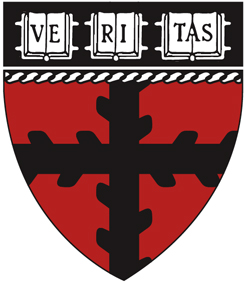
The Harvard John A. Paulson School of Engineering and Applied Sciences (SEAS) is the engineering school within Harvard University's Faculty of Arts and Sciences, offering degrees in engineering and applied sciences to graduate students admitted directly to SEAS, and to undergraduates admitted first to Harvard College. Previously the Lawrence Scientific School and then the Division of Engineering and Applied Sciences, the Paulson School assumed its current structure in 2007. Francis J. Doyle III has been its dean since 2015.
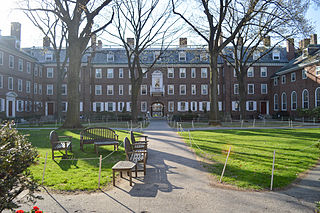
Kirkland House is one of twelve undergraduate residential Houses at Harvard University, located near the Charles River in Cambridge, Massachusetts. It was named after John Thornton Kirkland, president of Harvard University from 1810 to 1828.

Evelynn Maxine Hammonds is an American feminist and scholar. She is the Barbara Gutmann Rosenkrantz Professor of the History of Science and Professor of African and African-American Studies at Harvard University, and former Dean of Harvard College. The intersections of race, gender, science and medicine are prominent research topics across her published works. Hammonds received degrees in engineering and physics. Before getting her PhD in the History of Science at Harvard, she was a computer programmer. She began her teaching career at the Massachusetts Institute of Technology, later moving to Harvard. In 2008, Hammonds was appointed dean, the first African-American and the first woman to head the College. She returned to full-time teaching in 2013.

Harvard University is a private Ivy League research university in Cambridge, Massachusetts. Founded in 1636 as Harvard College and named for its first benefactor, the Puritan clergyman John Harvard, it is the oldest institution of higher learning in the United States and among the most prestigious in the world.

Quincy House is one of twelve undergraduate residential Houses at Harvard University, located on Plympton Street between Harvard Yard and the Charles River. The second largest of the twelve undergraduate houses, Quincy House was named after Josiah Quincy III (1772–1864), president of Harvard from 1829 to 1845. Quincy House's official counterpart at Yale University is Branford College.
Stanley Nider Katz is an American historian specializing in American legal and constitutional history and the history of philanthropy. He is director of the Princeton University Center for Arts and Cultural Policy Studies and director emeritus of the American Council of Learned Societies. He graduated from Harvard University with an AB (1955), MA (1959), and PhD in American colonial history (1961). He taught at Harvard from 1961 to 1965, serving as Allston Burr Senior Tutor of Leverett House from 1963 to 1965. He went on to teach at the University of Wisconsin–Madison (1965–70), the University of Chicago Law School (1970–78), Princeton University (1978–1986), and the Woodrow Wilson School of Public and International Affairs. In addition to serving as president of the Organization of American Historians (1987-1988), Katz served as president of the American Council of Learned Societies from 1986 to 1997, for which he was awarded a 2010 United States National Humanities Medal. Katz was elected to the American Academy of Arts and Sciences in 1991 and the American Philosophical Society in 1996.

The 2012 Harvard cheating scandal involved approximately 125 Harvard University students who were investigated for cheating on the take-home final examination of the spring 2012 edition of Government 1310: "Introduction to Congress". Harvard announced the investigation publicly on August 30, 2012. Dean of Undergraduate Education Jay M. Harris described the case as "unprecedented in its scope and magnitude". The Harvard Crimson ranked the scandal as the news story most important to Harvard in 2012.

Harvard Innovation Labs (i-Lab) is an institution which aims to promote team-based and entrepreneurial activities among Harvard students, faculty, entrepreneurs, and members of the Allston and Greater Boston communities. The i-Lab's mission is to bring together students from Harvard's various schools to foster innovation across the University.